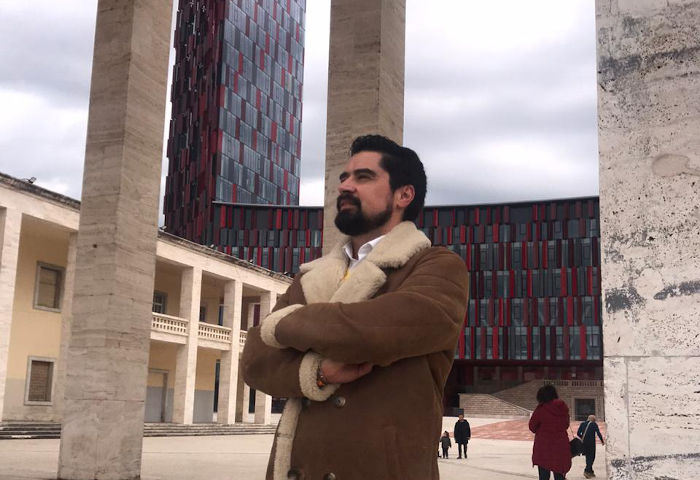-
02 April 2020
Category : Interview
FIIAPP Expatriates: Alberto Herrera
'This experience is posing a fascinating challenge'
 The twinning coordinator, Alberto Herrera
The twinning coordinator, Alberto HerreraAlberto Herrera, coordinator of the Twinning project ‘Strengthening the Competition Authority of Albania‘, tells us about his experience as an FIIAPP expatriate.
What was your arrival in Albania like? Do you remember anything amusing at that time?
The start of the Twinning project was at the end of last July, specifically on the 23rd, coinciding with the start of the summer holiday period preferred by the Albanians, which, as in Spain, and due to the high temperatures, is the month of August.
As a result, throughout that month, my team (made up of an assistant and an interpreter) and I were working practically alone, which, having recently arrived and working in a foreign institution, made the beginnings a little more complicated.
On one occasion, we even got locked inside the building of the project beneficiary institution, the Competition Authority of Albania. Those in charge of closing the facilities at the end of the day, seeing that the usual Albanian staff had left, proceeded to lock up, forgetting that “the Spanish”, as my collaborators (also Albanian) called us, were still working. We had a hard time finding the person with the keys, but we took it all with great humour.
Apart from that, I would highlight the complicated times as a result of the earthquake suffered in the Tirana-Durrës region, in the early hours of 25-26 November, and the strong aftershocks that occurred for more than a week.
And the adaptation period? What were the most and least difficult things for you?
Tirana is generally a pleasant and peaceful city, full of cafés, restaurants and terraces. Albanians have a warm, Mediterranean character: they like to enjoy public spaces and gather around a good table or chat for hours in cafés. Their cuisine is highly elaborate and the result of an interesting mix between the country’s Balkan heritage and Italian, Turkish and Greek influences. The variety and quality of its fish is particularly striking, which for a person from the coast like me, a native of Cartagena, Spain, is really appreciated.
The main adaptation problems come from the different cultural codes, and from the difficulty communicating. In this regard, the gestural and body language (ways of agreeing, showing disagreement, etc.) is different from that used in Spain or in other countries around us, which can sometimes be puzzling.
Is this your first experience of living outside Spain? Is it proving to be very different from your previous ones? How long have you been there and how much time do you have left?
Apart from academic stays abroad in countries of the same historical and cultural context, such as Portugal, this is my first long-term work experience in another country.
Given that the project started at the end of July 2019 and is expected to go on for one year, I might be said to be just over halfway.
What is your work like, your daily routine? Is it very different from the routine you had in Spain?
My daily routine is very similar to the one I had in Spain, given that the Albanian Public Administration hours are very similar to those in our country. You start work very early and finish at a reasonable time, which makes it easier to achieve a balance between work and family.
What does differ a lot is the way of working with respect to my position in the National Commission of Markets and Competition (CNMC), since my functions as Resident Twinning Adviser require constant coordination between multiple players, not only from Albania but also from Spain and, of course, from the European institutions, as it is a project funded by the European Union.
What is the relationship with FIIAPP like?
FIIAPP is in charge of managing the budget and organising the trips of the experts from the National Commission of Markets and Competition (CNMC), and of supervising and advising on the preparation of internal documents and following up on the governing administrative procedures.
There is therefore very close and constant collaboration with FIIAPP staff, without which it would be impossible to achieve the objectives. The functions and support provided by the FIIAPP technician in charge of this project, Ángela García-Monge, are essential.
Likewise, the work carried out by the personnel in charge of organising the trips of the experts participating in the activities of the Twinning project is essential. Finally, I would like to highlight the advice provided by the FIIAPP Communication department as well as the always prompt response and attention provided by Human Resources.
How would you rate your experience of working as a FIIAPP expatriate?
Without a doubt, and after the first semester of the project, my experience is proving very positive. From a professional point of view, this is an opportunity to expand and diversify my CV and my job skills.
From a personal point of view, the experience of living in a country with a different culture and idiosyncrasy, in which people of different religions coexist in harmony, is totally enriching.
But as well as an opportunity, this experience is posing a fascinating challenge: leaving my comfort zone and facing new ways of thinking, working, observing and understanding life.
In short, realising that we are all equal, with or in spite of our differences. Or, in the words of the Brazilian writer, Clarice Lispector:
“Life is the same everywhere and people have to be people.”
The views and opinions expressed in this blog are the sole responsibility of the person who write them.




